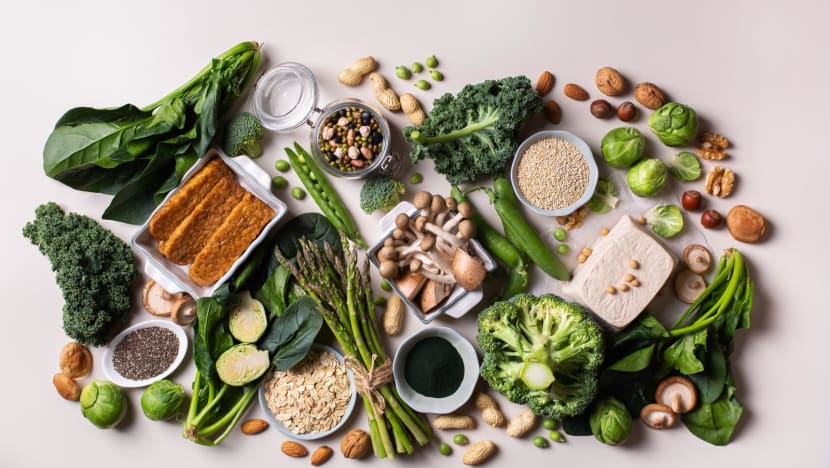Commentary: I was vegan for years - then I had a heart attack
An unprocessed, plant-based diet can only reduce health risks, not eliminate them entirely, says George Jacobs, former president of Vegetarian Society (Singapore).

Research suggests many health benefits of moving toward a plant-based diet, but health isn't always the main reason for stopping meat and other animal-based foods. (Photo: iStock/Aamulya)
SINGAPORE: In 1980, I became a vegetarian for what I planned to be a year. My main reason for it was reading Diet For A Small Planet, a book by food expert Frances Moore Lappe about how meat production contributes to world hunger.
My one year of vegetarianism became 43 years. During that time, I went vegan and became an activist for plant-based diets and alternative protein, heading Vegetarian Society (Singapore) for more than 10 years.
Then, on Mar 18 this year, I had a heart attack, needing two stents and a lot of medication.
It wasn’t supposed to happen. Aren’t vegans “heart attack-proof”? I felt a bit like the fitness guru, Jack LaLanne, who until his death at age 96 in 2011, used to say: “I can’t die, it would ruin my image”.
My diet was good. I wasn’t a “junk food vegan”. Even with all the vegan ice cream, cakes, and other sweets newly arrived on the market, I stuck mostly to less processed plant foods.
I didn’t eat fried foods or refined grains. I resisted the siren song of potato chips and other salty snacks, and stayed far away from sugary drinks. Overall, I knew to avoid foods high in SOS (Salt, Oil and Sugar).
Also, I exercised regularly: Walking 10,000 steps on most days, plus swimming and playing pickleball and tennis.
Despite this exercise and my diet, my weight rose slowly but surely as I reached 70 years of age in 2022, with a body mass index of 24.2. My LDL cholesterol level - the “bad” cholesterol - was higher than it should have been.
GOOD HEALTH ISN’T JUST ABOUT DIET
When it comes to health, diet is important, but there are many other determinants including genetics, exercise, smoking, pollution and stress.
For instance, high cholesterol is partly hereditary: 20 per cent to 30 per cent of our cholesterol is from our food, while the bulk of cholesterol (70 per cent to 80 per cent) is synthesised by our liver and the amount made is genetically driven. Your lipid profile will be very similar to either your father or mother.
There is also the other factor of age. Life expectancy has increased. In the past, maybe you could get away without a heart attack if you only lived into your 60s. As so many of us live longer, into our 80s and 90s, those additional years of high cholesterol make the likelihood of getting a heart attack higher.
For what it’s worth, my father and his only sibling both passed away due to heart problems at about age 50, although their problems were not the same as mine. My mother, who passed away at age 75 from cancer, had high cholesterol.
A good diet reduces health risks; but it can’t eliminate them entirely. A vegan diet wouldn’t guarantee obese smokers would not get a heart attack, but it reduces their risk compared to having a carnivorous diet.
My example shows that even vegans can have heart and other health problems, so those who limit their meat consumption cannot be overconfident. We can continue taking advantage of national programmes and facilities to monitor, maintain and improve our physical and mental health.
Related:
We can also continue to be curious and learn about nutrition. Vegans and vegetarians need to make sure they are getting enough vitamin B12, for which there are inexpensive supplements.
MORE REASONS BEYOND HEALTH TO BE VEGAN
Health never was my main reason for stopping meat and other animal-based foods, although research suggests many health benefits of moving toward a plant-based diet, such as lower risks of Type 2 diabetes, high-blood pressure, obesity, and cardiovascular mortality.
Beyond health, there are many compelling reasons to move toward alternative protein. Increasingly on people’s minds is the carbon footprint of meat, long-known to be linked to deforestation and greenhouse gases. Overfishing threatens our long-term supply of seafood. Eating animals creates the risk of zoonotic pandemics, such as swine flu, bird flu and COVID-19.
So, what about my future? I’m slowly and, I hope, surely regaining my health. I am disappointed that my vegan diet did not save me from a heart attack, but I always knew that merely avoiding animal foods is not a panacea for health.
I remain committed to veganism. Even in the unlikely event that I became convinced that a plant-based diet was not optimal for my health, I would continue to follow it, because it is one way that with every meal, I can do a little bit of good for others and the planet.
George Jacobs, PhD, is former president of Vegetarian Society (Singapore) and serves on the board of Kampung Senang Charity and Education Foundation.


















